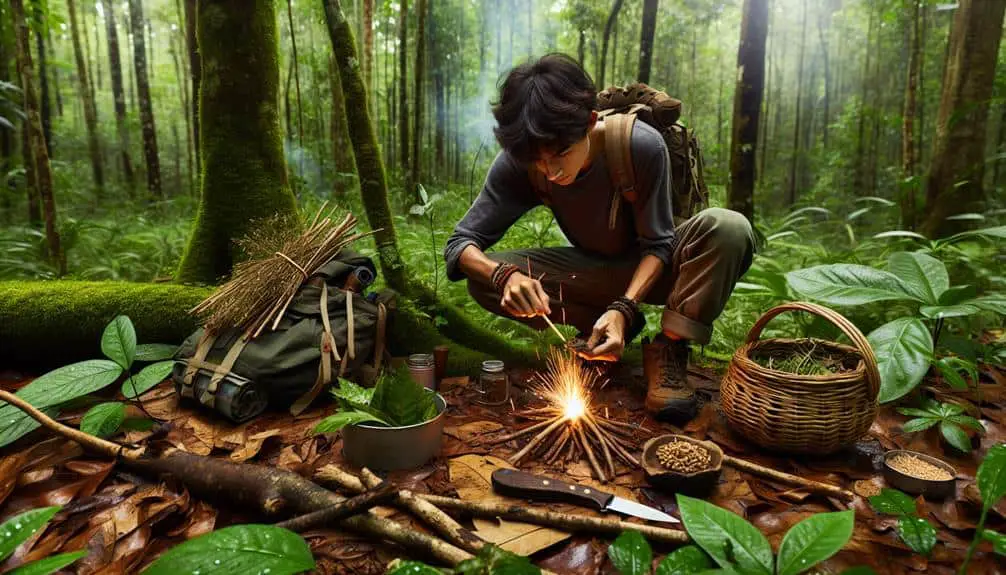Begin an exciting journey with the best outdoor survival skills curriculum for homeschoolers. Acquire essential skills and expertise to conquer the wild confidently. Master tasks like building shelters, starting fires, and finding food sources through hands-on experiences. Practical field training sharpens your abilities in real-life settings and fosters adaptability. The curriculum focuses on problem-solving and quick decision-making, preparing you for any survival scenario. Enhance your learning with interactive courses, field guides, and online resources. This curriculum will equip you with the skills needed to thrive outdoors and embrace challenges with resilience.
Key Points
- Prioritize hands-on learning experiences for practical skill development.
- Include building shelters, starting fires, and identifying food sources in the curriculum.
- Focus on problem-solving, adaptability, and quick decision-making skills.
- Evaluate effectiveness through real-world scenario simulations and skill assessments.
- Utilize varied resources like field guides, online platforms, and interactive courses for enhanced learning.
Importance of Outdoor Survival Skills
Understand the crucial importance of mastering outdoor survival skills for your safety and preparedness in any situation. When setting out on outdoor adventures, whether trekking through the woods or camping in the wilderness, being equipped with the necessary skills can make all the difference. Wilderness preparedness isn't just a matter of convenience; it's an essential aspect of ensuring your well-being and that of those around you.
Having a strong foundation in outdoor survival skills can empower you to navigate through challenging terrains, handle emergency situations, and even save lives. From constructing shelters and starting fires to locating food and water sources, these skills are indispensable. They provide you with the confidence and capability to stay calm and composed in the face of adversity.
Key Components of Survival Curriculum
In designing a robust outdoor survival skills curriculum, prioritize hands-on learning experiences that simulate real-life scenarios and emphasize practical application. Engaging in hands-on learning allows you to develop essential skills through direct experience, making the knowledge more tangible and memorable.
Wilderness challenges provide a dynamic environment where you can put your survival skills to the test, honing your ability to adapt and problem-solve in unpredictable situations. These challenges could include building shelters, starting fires without matches, identifying edible plants, and orienteering using a map and compass.
Incorporating Practical Field Training
As you immerse yourself in the wilderness challenges of your outdoor survival skills curriculum, practical field training becomes the cornerstone for honing your abilities and putting your knowledge to the test. Field exercises offer hands-on learning experiences that bridge the gap between theory and practice. These activities range from building shelters and starting fires to exploring unfamiliar terrains and foraging for food.
Engaging in field exercises allows you to apply the techniques and principles you've learned in a real-world setting. It's where you discover the true extent of your capabilities and where your skills are put to the ultimate test. Through hands-on learning, you gain confidence in your survival skills and develop the adaptability needed to thrive in the wilderness.
Field training also provides a valuable opportunity to enhance teamwork and communication skills. Working together with fellow learners in challenging outdoor scenarios fosters a sense of camaraderie and mutual support. These experiences not only strengthen your survival skills but also cultivate important life skills that extend beyond the wilderness.
Evaluating Curriculum Effectiveness
To assess the effectiveness of your outdoor survival skills curriculum, measure the practical application of learned techniques in real-world scenarios. Evaluating progress is vital in ensuring that the skills being taught are being internalized and can be utilized when needed. One effective way to evaluate progress is through skill assessment exercises that simulate survival situations. These exercises can range from building shelters to starting fires using different methods, all while emphasizing safety and efficiency. By observing how well these tasks are performed, you can gauge the level of understanding and proficiency your homeschooler has acquired.
Another aspect to contemplate when evaluating the curriculum's effectiveness is the ability of your homeschooler to adapt and think critically in challenging situations. Assess how well they apply problem-solving skills, prioritize tasks, and make quick decisions under pressure. These skills are essential in real-life survival scenarios and can indicate the overall effectiveness of the curriculum in preparing your homeschooler for outdoor challenges.
Resources for Enhanced Learning
Explore a variety of resources that can elevate your homeschooler's learning experience in outdoor survival skills. To enhance their understanding and practical skills, consider the following:
- Hands-on Activities: Engage your homeschooler in real-life scenarios like setting up a campsite, starting a fire without matches, or identifying edible plants in your area. These activities not only teach valuable skills but also build confidence and resilience in outdoor settings.
- Online Resources: Utilize online platforms offering virtual simulations, interactive courses, and video tutorials. Websites dedicated to survival skills can provide in-depth knowledge on navigation, shelter building, first aid, and more. Encourage your homeschooler to explore these resources under your guidance to supplement their learning.
- Field Guides and Books: Invest in quality field guides and books focusing on wilderness survival, plant identification, animal tracking, and other related topics. These resources serve as valuable references during outdoor excursions and help deepen your homeschooler's understanding of the natural world.



